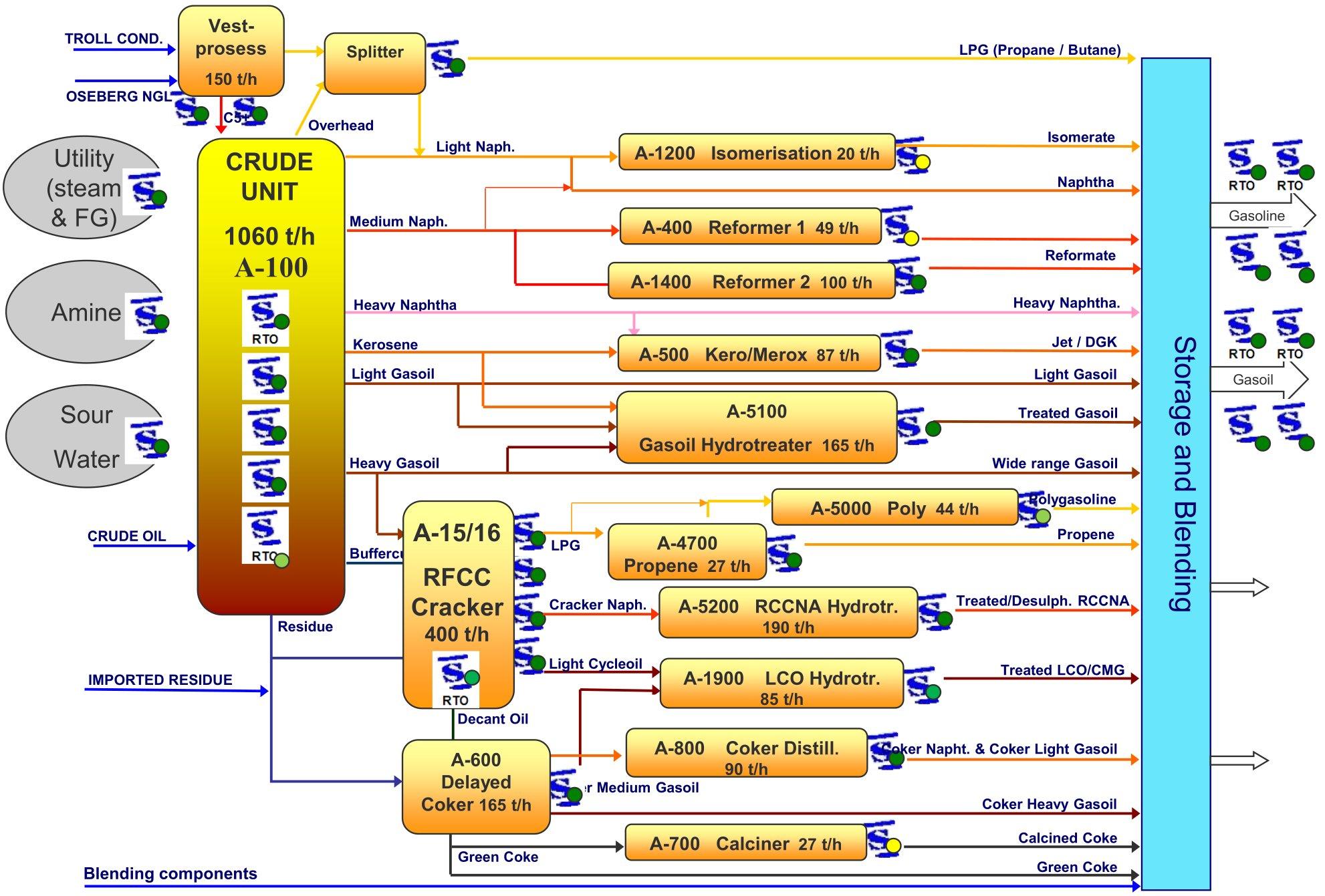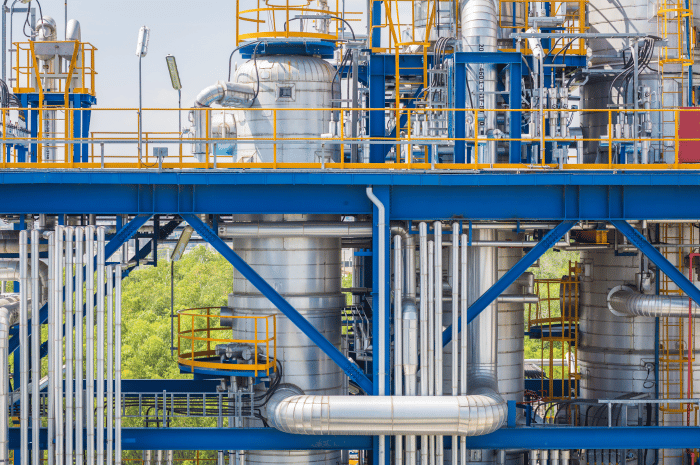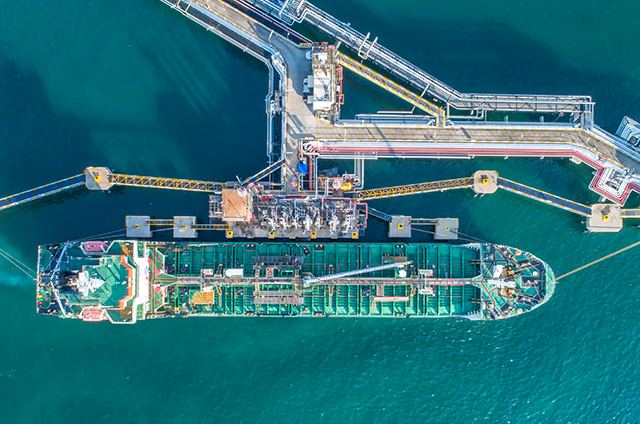
The Mongstad Refinery is Norway's largest oil refinery and one of the most advanced refineries in Europe, strategically located in Vestland County on Norway's west coast. Operated by Equinor ASA through its subsidiary Equinor Refining Norway AS, the facility commenced operations in 1975 and has undergone significant expansions and technological upgrades throughout its nearly 50-year operational history.
The refinery is situated in the Alver Municipality (formerly Lindås Municipality) in Vestland County, approximately 60 kilometers north of Bergen along the scenic Fensfjord. This strategic location provides direct access to deep-water ports and connects the facility to Norway's offshore oil fields through dedicated pipeline infrastructure.
Processing Capacity and Scale
Core Specifications
The Mongstad Refinery operates with an annual crude oil processing capacity of approximately 12 million tonnes of crude oil (226,000 barrels per day). This capacity makes it the largest refinery in Norway, though it remains medium-sized by European standards.
The facility processes approximately 40% of Norway's total crude oil production from the Norwegian Continental Shelf, making it a cornerstone of the nation's petroleum industry. All crude oil refined at Mongstad originates from the Norwegian Continental Shelf, particularly from major fields including Troll, Statfjord, and Johan Sverdrup.
Operational Evolution
The refinery's capacity has grown significantly since its inception:
- 1975: Initial operations with 6.5 million tonnes annually
- 1985: Expanded to 8 million tonnes following the first major expansion
- 1989: Increased to 10 million tonnes with additional process units
- Present: Current capacity of 12 million tonnes annually
Major Processing Units and Technology
In addition to crude distillation units, the Mongstad Refinery incorporates several sophisticated processing units including a UOP Reduced Crude Conversion (RCC) catalytic cracker, catalytic reforming units, multiple hydroprocessing facilities, isomerization, delayed coking units, and an olefins oligomerization unit. These secondary processing units maximize product yields and enable the production of high-quality gasoline, diesel, jet fuel, and petroleum coke.
A block flow model of the Mongstad refinery as of 2014 in presented in Fig. 1, corresponding to a crude distillation capacity of approximately 9 million tonnes per year.
Figure 1 - Model Predictive Control of Mongstad refinery as of Oct 7, 201411

Integrated Industrial Complex
Crude Oil Terminal (MTDA)
The Mongstad Terminal and Depot (MTDA) forms an integral part of the complex, featuring:
- Storage capacity: 9.44 million barrels in underground rock caverns
- Pipeline connections: Direct links to Troll B, Troll C platforms via 83-kilometer pipelines
- Ownership structure: 65% Equinor, 35% Norwegian State
- Strategic function: Intermediate storage for one-third of Norwegian Continental Shelf production
Natural Gas Processing
The Vestprosess natural gas liquid (NGL) fractionation plant processes wet gas and condensate from offshore fields, adding value through separation and purification of natural gas liquids.
Power Generation
The Mongstad Power Station, commissioned in 2010, provides integrated energy solutions:
- Combined cycle configuration: Two gas turbines and one steam turbine
- Total capacity: 296 MW of electrical power
- Heat supply: Steam and thermal energy for refinery operations
- Offshore power: Electricity transmission to Troll A platform and Kollsnes processing plant
Product Portfolio and Output
Primary Products
The Mongstad Refinery produces a comprehensive range of refined petroleum products:
- Gasoline: Production equivalent to 150% of Norwegian domestic consumption
- Diesel fuel: High-quality automotive and marine diesel
- Jet fuel (Aviation fuel): Meeting international aviation specifications
- Liquefied Petroleum Gas (LPG): For domestic and industrial applications
- Petroleum coke: Raw material for aluminum anode production
- Light petroleum products: Various specialty chemicals and feedstocks
- Natural gas liquids: Through the integrated Vestprosess plant
Market Distribution
Approximately 80% of the refinery's production is exported to international markets, with primary destinations including:
- European markets: Serving as a key supplier to continental Europe
- North American markets: Regular shipments to the United States
- Asian markets: Growing export volumes to Asia-Pacific region
The remaining 20% serves Norwegian domestic demand, contributing significantly to national energy security.
References
- Equinor. Monstad refinery.
- Mongstad Refinery. Mongstad Refinery home page and other pages.
- NS Energy. June 7, 2024. Mongstad Facility, Norway.
- Oil&Gas Journal. Mar 12, 1990. EXPANDED MONGSTAD REFINERY HAS MAJOR EXPORT ROLE.
- Asset Buyout Partners. Western Norway.
- Power Technology. Jul 20, 2008. Mongstad CHP Refinery, Norway.
- energy, oil & gas magazine. Dec 9, 2010. The Mongstad Refinery.
- Technology Centre Mongstad. Apr 12, 2024. TCM’s good neighbor has visionary plans at Mongstad.
- Oil&Gas Journal. Aug 29, 2013. Mongstad refinery upgrade due study.
- Kjell Arild Anfinsen. Dec 19, 2022. Report of the investigation of the fire at Mongstad on 3 July 2022. Petroleumstilsynet.
- Stig Strand. Nov 7, 2014. MPC in Statoil. Norges teknisk-naturvitenskapelige universitet.


















